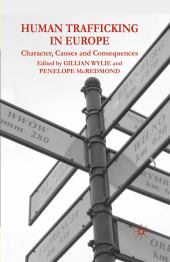 Neuerscheinungen 2010Stand: 2020-01-07 |
Schnellsuche
ISBN/Stichwort/Autor
|
Herderstraße 10
10625 Berlin
Tel.: 030 315 714 16
Fax 030 315 714 14
info@buchspektrum.de |

Penelope McRedmond, Gillian Wylie
(Beteiligte)
Human Trafficking in Europe
Character, Causes and Consequences
Herausgegeben von Wylie, Gillian.; McRedmond, Penelope
1st ed. 2010. 2010. x, 230 S. 216 mm
Verlag/Jahr: SPRINGER PALGRAVE MACMILLAN; PALGRAVE MACMILLAN UK 2010
ISBN: 1-349-31045-X (134931045X)
Neue ISBN: 978-1-349-31045-6 (9781349310456)
Preis und Lieferzeit: Bitte klicken
This book focuses on human trafficking in Europe for labour and sexual exploitation. It includes empirical work on trafficking throughout Europe, identifying underlying causes in globalization, migration policies and gender inequality. It questions whether European responses- from policy makers or civil society are adequate.
Human Trafficking in Europe; G.Wylie & P.McRedmond Slavery: Exception or Rule?; R.Munck Theoretical Perspectives on Slavery; L.Arocha Shirking Responsibilities: Receiving Countries and the Structural Causes of Conflict Related Child Trafficking; D.Davitti The Phenomenon of Trafficking in Human Beings: The Case of Poland; M.Wi?niewski A Business of Supply and Demand: The Trafficking of Women and Girls from Russia and Ukraine; C.Deighan Trafficking in Albania: The Present Reality; I.Poole Lap Dancing Clubs and Red Light Milieu: A Context for Sex-Trafficking of Women to Ireland?; E.Ward & G.Wylie Trafficking for Sexual Exploitation: Researching the Demand Side; M.Papantoniou-Frangouli & T.Moritz Preventing Trafficking in Human Beings: the Case of Moldova; C.Nanu Accessing Help and Services: Trafficking Survivors´ Experiences in the United Kingdom; A.Jobe Defining Organized Crime in the Context of Human Trafficking; P.McRedmond Extra-Territorial Jurisdiction: A Prosecutorial Tool to Combat Child Trafficking from Albania; I.Farka Conclusion; G.Wylie & P.McRedmond
´This cutting edge book illustrates the contested nature of trafficking in persons and its implications for policy-making. It calls for better attention for the prevention of trafficking and acknowledges the existence of forced labour in all industries and domestic settings. It boldly takes trafficking studies away from narrow debates on the best way to protect sex workers, to restrict migration, or to punish criminal gangs into the debate on severe human rights violations and the structural pressures that lead to vulnerability to exploitation of migrants.´ - Dr Christien van den Anker, School of Politics, University of the West of England, UK


